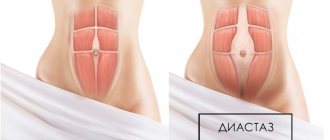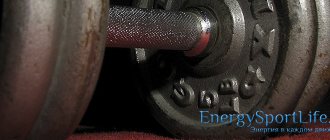weight gain as simply an unpleasant phenomenon, but it is most often the result of overeating and a sedentary lifestyle. Weight gain can lead to obesity, and it affects more and more people around the world in industrialized countries. And being overweight, for example, can have a negative impact on the cardiovascular system.
Why does weight increase when playing sports? Why does weight increase when doing fitness?
Have you decided to go in for sports and have been regularly visiting a fitness club for some time in order to lose weight? Two to three weeks of training pass, and suddenly you discover with horror that your once normally fitting jeans are starting to “burst at the seams”, and the scales show an increase of 1.5-2 kg? How so! After all, excess fats should “evaporate” from a body filled with energy! Are exercise really useless and can even cause you to gain pounds?
Problem: increase in weight and volume at the beginning of fitness training.
I advise anyone who has encountered similar problems not to be afraid and not to give up training. A slight increase in weight at the beginning of exercise can occur for several reasons, and each of them has its own solution.
The first thing to do if you notice weight gain is to calm down and wait a little - about 1-2 weeks. Do not rush to write off “Plus” in fear as muscles! Many people mistake these unfortunate 1.5 kg for muscles and begin to think that they are the ones who “pumped up” so much. Calm down, muscles don’t grow that fast; for example, a woman who works out hard in the gym and follows a high-protein diet can gain only 500 g of muscle mass in a month. Therefore, discard these prejudices and do not be afraid that dumbbells weighing 3-4 kg can turn you into a bodybuilder in a month.
What is the reason for weight gain?
The most common reason for weight gain and size is the accumulation of fluid in the muscles.
When you give your muscles an unusual load, they begin to require more nutrients, because of this the amount of circulating blood and fluid increases (it’s not for nothing that they advise you to drink more during training. This fluid accumulates in the muscles (they contain a special substance - glycogen, which is able to retain water if necessary. In this way, the muscles adapt to the load. Increased muscle tone is also the reason for a slight increase in volume. But! Already 2-4 weeks after the start of training, the body will somewhat adapt to physical activity, metabolism will accelerate, and the excess liquid will “go away”, and along with it fat deposits will begin to “melt”.
You can also help your body in this case - stretching, massage, a warm bath or sauna will help restore muscles and have a lymphatic drainage effect. After each workout, be sure to stretch all the muscle groups that you worked; this is an essential condition for good results. It is useful to take a bath with sea salt - the minerals have a relaxing effect, and the salt itself removes excess fluid from the body. Go for a lymphatic drainage massage session or a steam room - these procedures are very good for helping the body cope with stress.
Another reason is nutrition, or more precisely, overeating.
Some people think: “Since I go to Fitness, I can Eat whatever I want.” I’ll probably disappoint someone, but it’s impossible to do fitness, eat everything and lose weight. Even the most energy-intensive physical activity will not help if you do not monitor your diet. To burn the calories from one chocolate bar, you need to run for a little over an hour at a good pace. Are you capable of this? Sports and proper nutrition are inseparable, so do not give in to gastronomic temptations.
Stage one – weight loss occurs
Let's imagine that someone decided to follow a fasting diet to reduce their weight. I excluded something, limited something. After 6 pm I decided not to eat at all. Since there are fewer calories in this diet than he burns, the missing difference is covered by the breakdown of fat, and weight initially decreases
.
But not only due to fat. Indeed, in addition to fat, in the first days there is also an abundant secretion of fluid associated with glycogen and salts. As well as loss of protein and protein tissues, especially muscle
, which is also typical for semi-starved diets.
Under particularly hungry conditions, the rate of muscle tissue consumption can be comparable to fat consumption. For every 1 kg of fat lost, there will be 1 kg of muscle lost.
Weight gain from playing sports. Why do I gain weight when playing sports?
Having decided to go in for sports in order to lose weight, you start visiting the fitness center and work out hard, without putting down dumbbells. And suddenly, one fine day, you are horrified to see that the jeans that fit you quite well before training suddenly cannot fit. Jumping headlong onto the scales, you also see a weight gain of one and a half to two kilograms. How could this happen? After all, you work out hard, you sweat so much during training. And the result? How can playing sports play such a joke - instead of reducing kilograms and volumes, contribute to their increase?
The most common reason for weight gain and size is the accumulation of fluid in the muscles.
- First, panic aside. Gaining weight at the very beginning of exercise can happen for several reasons. However, they all have solutions. If you notice that you are getting better, you need to try to pull yourself together and wait for two weeks.
The first reason for the increase in volume and weight lies in the accumulation of fluid in muscle tissue. At the beginning of training, muscles that are unaccustomed to such loads need more nutrients. Because of this, the amount of fluid and fluid circulating in them increases. Liquid accumulates faster in the muscles, and they, in turn, contain the substance glycogen, which has the ability to retain water if necessary. This is how the muscles try to adapt to the load. However, within a few weeks after the start of classes, the body will be able to fully adapt to physical effort, the metabolic rate will increase, and excess fluid will be eliminated from the body.
- You can help him deal with this faster. A massage, Russian sauna or warm bath promotes more active muscle recovery and has a lymphatic drainage effect. A bath with sea salt is very useful in such cases; it enhances the warming effect, nourishes the skin with minerals and nutrients, and also has a relaxing, soothing effect.
The second reason for weight gain after starting training is elementary overeating. A person begins to think that since he works out hard, he should also eat hard. But this is a fundamentally wrong opinion. Any increase in fatty or sugary foods can negate the most energy-intensive activities. You need to remember that food intake should be as constantly monitored as the training itself. Only then will they be able to bring the desired result.
Stage three - weight loss has stopped, weight is increasing again
Indeed, while everything was going well and the weight was falling, our friend was ready to endure all this torment. Now, seeing that the weight was “worth it,” he began to little by little break the regime. The thoughts that visited him at the same time are well known to many who are losing weight: “ I am weak-willed, I am weak, I will never achieve anything in this life.”
" And vows to take charge of himself again from tomorrow... And so on, until one day it becomes completely clear to him that he has “lost it.”
And it is very important for us to understand that our friend would have “lost it” in any case. After all, why does a person break down every time he bans himself from any product? Because any prohibition comes back to us as an obsession! And the simplest and often the only way to avoid obsession is to succumb to it...
After all, now our hero must have a very good idea of the product that is forbidden to him. He must really want to eat this product (otherwise, why ban it?). And a vicious circle develops. The more he wants IT, the better and more clearly he imagines IT in all its rich colors.
And, accordingly, the more afraid he is to eat IT! And the more it prohibits!!
But the more desperately he forbids, the more he wants...!!! And so on in increasing order.
The idea “I want!” rushes in a circle, intensifying with each turn. A kind of cyclophastron. And there is only one way out of this circle: “break away.” And this exit is due to human nature. And the same breakdown mechanism occurs with bans on late meals, when “you can’t eat anything after six o’clock in the evening,” and with any other strict regulation of nutrition.
Think about the literal meaning of the saying “The forbidden fruit is sweet!”
Isn’t it because it’s SWEET because we CAN’T have it?!
Of course, our friend can continue to hypnotize himself with the idea of his own weak-will. But if these breakdowns are characteristic of the vast majority of people, then let us finally agree - to endure a long-term decline in the quality of life caused by numerous prohibitions is simply contrary to human nature
. Why? Yes, because that’s how we are made! Because man was not created for torment. He was created for happiness, like a bird for flight!
By the way, a little to the side. Most of my patients come to me with the confidence that only their lack of will (cowardice, worthlessness! Lord, how can one live, thinking such things about oneself!?) does not allow them to overcome the hardships of the diet
. Friends, the vast majority of us fail to do this! And not because we are all weak and weak-willed here, but because we are designed that way. We can't jump over a house, we can't go without air for more than five minutes, we can't run at the speed of a cheetah. There are many things we cannot do, including losing weight and maintaining normal weight through prohibitions.
And instead of thinking all sorts of nasty things about yourself, join us, the company of normal people. We will pose and solve only those problems that can be solved!
Why doesn't weight come off when playing sports? Why doesn't weight come off with regular exercise?
Instantly losing excess weight through periodic exercise is not as easy as it seems at first glance.
Very often the final result is stunning, because instead of the long-awaited loss of kilograms, an even larger number appears on the scales.
Important!
Naturally, you are confused about why it happened, so you worked out hard, but gained extra weight. Don't be upset, because this happens often...
In such cases, most begin to torment themselves with searches for the cause, torment themselves with guesses, questions arise, and you desperately try to find a solution to this problem. Maybe you need to train more intensely, or maybe you need to eat less and the like.
First, you need to stop panicking and read the reasons and some tips described in this article that may help you lose weight.
Muscle growth
For beginners on a diet, weight gain while playing sports is quite common.
The reason for this is the increase in muscle mass under the influence of loads. It turns out that instead of fat, muscle fibers are formed in your body. And since muscle is 30% heavier than fat, you will naturally gain weight.
In general, all the mass you have gained is due to the fact that your muscles have increased, and not from the appearance of new fat deposits. As a result, you get stronger and healthier, so gaining weight in this case is very useful.
You eat few calories
By following a diet, you begin to consume fewer calories than required to maintain the body. This is a mistake that should be avoided.
Due to the lack of calories in the body, your metabolism will begin to slow down in order to conserve energy. As a result, the fat reserves in your body increase and you gradually begin to gain weight.
To avoid this, you need to organize your diet, eat the correct ratio of proteins, carbohydrates and fats, eat enough vitamins and other healthy nutrients. Our body produces energy from them, so it is not recommended to exclude them from your diet.
Advice!
The best solution would be proper nutrition, in which you should eat less, but more often.
Wrong selection of exercises
Not all exercises help burn body fat. Let's say a 40-minute walk down the street will not allow you to consume a large number of calories. You will need to walk at a faster pace and at least 3-5 times a week. Only then will the results be noticeable, and not immediately, but for about a month.
In the future, you need to increase the load on your body in order to burn the largest number of calories per session. Race walking, running, and fitness are the best sports for quick weight loss.
But! Don't focus on workouts that only work one muscle group. After all, the more muscles you use during training, the more calories you burn.
Eating extra calories
Some people, having started playing sports, do not consider it necessary to count calories. But in vain! After all, it happens that we begin to consume more calories than we manage to burn during physical exercise.
In addition to training, you should monitor your diet to achieve successful results in losing extra pounds. If you increase your caloric intake, your exercise activity must also increase so that your body has the opportunity to burn all those extra calories.
Health problems
But there are cases when people eat right, consume the necessary minerals and vitamins, but their weight does not change, or even increases. Most likely these people are not healthy.
In such cases, it is strongly recommended to consult a doctor to identify and promptly eliminate all your diseases.
Attention!
Taking contraceptive and hormonal medications also negatively affects your weight loss.
Stress and negative emotions
An important factor stopping you from losing weight is stress.
If you are tense inside, have anxious thoughts in your head, and are constantly worrying about something, then most likely you are not getting enough sleep. Scientists have proven that sound, deep sleep promotes weight loss. Solve all your problems and free yourself and your subconscious from anxiety and give yourself at least an hour of extra sleep a day. This will definitely help you in the fight against extra pounds.
I hope this article will help you identify the reasons why exercise is not bringing you any results. Try to exercise regularly and monitor your proper nutrition, then you will succeed.
When the weight starts to fall after training. Muscle enlargement
In the first month after starting training, almost all girls notice weight gain instead of the desired decrease. The mood is hopelessly spoiled - is it really all in vain, why didn’t you manage to lose weight? Nothing terrible happens, everything is explained very simply.
With active training, heavy muscle tissue begins to be built, replacing lighter fat fibers. The body becomes stronger, more resilient, and the body spends much more energy on fully maintaining the muscles than on maintaining the fat layer. Do not forget about proper nutrition during this period and you will soon notice pleasant changes in shape in the mirror.
Plus, our body should have the opportunity to recover after training and rest. Muscle pain is the very first and clear signal that the stress did not go unnoticed and did its job. The process of muscle recovery is always accompanied by water retention, which is necessary for fibers to carry out all metabolic processes in cells. This explains the sharp increase on the scales of 1-2 kg. After 3-5 weeks, the excess liquid will come out on its own - you will immediately see this by the reduction in volume.
Proper nutrition and sufficient consumption of clean water during training helps to balance the functioning of hormones and accelerate metabolism, which will take more than one month. But as a result, the body will be completely rebuilt, tissue regeneration will accelerate, and losing weight will now not be difficult.
Why do you gain weight when running? 4 Reasons Why You Gain Weight When You Run Regularly
4 REASONS WHY YOU GAIN WEIGHT WHEN YOU JUNG REGULARLY
Even if you do not pursue the goal of losing weight through training, gaining pounds is certainly not part of your plans. Do you log tens of kilometers in every workout, and the scales show weight gain? It's time to figure out what's wrong!
“First, it's important to note that those pounds aren't necessarily fat, but possibly muscle—the density of hard, lean muscle mass is greater, and that can lead to weight gain,” explains Hayden VOSS, assistant general manager and trainer at the company. ENRGi Fitness. But are you sure that you are also adding fat mass along with muscle mass? Here are the possible reasons"
1. You overestimate the number of calories you burn.
Following your trainer's advice, you get a dose of complex carbohydrates, protein and good fats after your workout to help your muscles recover faster. But keep in mind that it is easy to overdo it with the “healing” portion. “If you're coming home from a long run, you can easily overestimate the number of calories you burned (you're so tired) or underestimate the number of calories contained in your post-workout meal,” says Natalia RIZZO, MD, a sports nutritionist at New York. “In this case, an increase in fat mass cannot be avoided.”
Monitoring the amount of fluid you drink throughout the day and eating something not too heavy but filling before training is a sure way to avoid hunger spikes after a run.
You can learn what is called intuitive eating to always keep your appetite under control. The system will teach you to better recognize hunger and satiety signals, says Heather Kaplan, a sports nutritionist. “Intuitive eating can be a very valuable tool for athletes.”
2. You forgot the power of fitness mixology
“If you follow the same routine of running, running, running every workout, you can lose muscle and gain fat,” warns Rebecca Gahan, fitness trainer, owner and founder of Kick. “Running the heart at the same steady rhythm can lead to fat accumulation as metabolism slows down and post-workout calorie burning slows down.” One way to combat this is strength training. Just one session a week with light weights is enough to maintain muscle mass and improve metabolism.
3. You drink too much during exercise.
Yes, you, smart girl, always remember the importance of timely hydration of the body, but even when quenching thirst, it is important not to overdo it! To avoid weight gain, it is important to find a middle ground. “If you weigh yourself immediately after working out and find yourself heavier than you were before you started working out, you're drinking too much water,” Gahan says. - This is dangerous not only because it is a plus on the scale. The consequences of such excess can be very serious: too much water leads to blood thinning and a deadly condition called hyponatremia.”
4. You have chronic inflammation
When you log miles during a workout, you heighten your body's physiological response to inflammation, which is why you may feel more swollen and puffy after a race, says Nate Helming, Reebok master trainer. - Inflammatory reactions (such as bloating) can lead to weight gain. “The best way to avoid these weight spikes is to recover properly after your workout, giving your body time to heal any muscle tears or strains. Eating anti-inflammatory foods may also help. Include cherry juice, avocado, salmon, greens and nuts in your post-workout menu.
Health problems
The intuitive nutrition system is designed for a healthy person with a normal metabolism. If, despite following all its principles, the weight still increases, then instead of doubting whether it is possible to lose weight on intuitive nutrition, it is necessary to exclude such a reason as metabolic disorders due to improper functioning of hormones.
This can only be done with confidence by contacting a specialist. Make an appointment with an endocrinologist and get the appropriate tests to make sure your levels are normal.
- thyroid hormones;
- insulin;
- leptin in the blood.
If everything is in order with your health, the reason should be sought only in eating behavior and your own habits.
Why do you gain weight when exercising? Muscle swelling
The most likely cause of weight gain after exercise is muscle swelling. In the first 2-4 weeks after unusual loads, water begins to be retained in the muscles, and they increase in volume and, accordingly, in weight.
This phenomenon is often confused with muscle growth. Due to her genetic characteristics, it is very difficult for a girl to gain even a kilogram of muscle. All pumped-up athletes, whose photos they love to post on social networks, take male hormones and use drugs that accelerate muscle growth. Their hormonal balance is shifted towards the male, and therefore it is very naive to believe that two or three workouts for a beginner will lead to muscle growth by a kilogram and a half. There will be virtually no muscle growth during normal training, so there is no need to worry about this. At the most, you will tone them up and make your body more prominent.
The weight of the human body is the sum of the weight of all its components: muscles, fat, bones, brain, nerve fibers, connective tissue, blood, lymph, intestinal gases, urine, and the air that we carry in our lungs.
Immediately after a normal workout, the ratio of all the components listed above can change by as much as 15 percent! Intense workouts are bound to cause your scale to fluctuate. Factors such as hydration, muscle inflammation from fiber breaks (sores), even the amount of byproduct or urine, as well as the volume of circulating blood will definitely affect the change in overall body weight.
What to do about it?
Doing nothing, this is a natural process in the body, there is no escape from it. Wait 2-3 weeks, the muscles will adapt to the load, and the weight will automatically go down. The main thing here is not to be afraid of the numbers and to systematically continue training, not paying attention to the scales.
Why does weight matter when playing sports? Why doesn't weight come off when exercising?
Beginners who engage in regular exercise in combination with a specific diet often wonder why they don’t lose weight when they exercise. The reason for this common phenomenon is that through regular exercise, the body builds muscle mass, which can spread throughout the body. It replaces gradually burned adipose tissue, etc. muscles are heavier than fat, you are unlikely to lose weight at first.
Muscle growth
The appearance of additional body weight during regular exercise is often associated with an increase in muscle mass rather than fat, the abundance of which has various negative effects on human health. This will help you make your body stronger and healthier than before. Therefore, you shouldn’t worry too much if you notice that the weight doesn’t want to go away, because... you gain muscle instead of fat. But at the same time, it is necessary to adjust your diet, diversifying it with healthy foods rich in various substances.
Lack of calories
When using a low-calorie diet to lose excess fat, people often end up consuming much fewer calories than necessary for normal body function. This is a very serious mistake, because... The appearance of a deficit of the required number of calories will lead to a slowdown in metabolic rate. It turns out that a low calorie diet will affect the increase in fat reserves in your body, because. The body will try hard to conserve energy. At the same time, you will feel tired and lethargic.
Basic metabolic disorder
The human body needs a constant supply of energy. Its sources are consumed food and stored fats with a very small amount of carbohydrates. When a person, through volitional efforts, reduces the amount of food he eats, the body begins to draw energy from internal reserves. But when it cannot or does not want to extract the required amount of energy from them, the body begins to reduce its expenditure. A mandatory precursor to this is the appearance of hunger, so appetite may increase after exercise. As a result, basic metabolism is disrupted.
Monotonous workouts
Why doesn't the weight come off with regular hour-long workouts? If you are faced with this problem even if you go to classes 4-5 times a week, then this is due to the fact that you are doing monotonous exercises. To solve it, use the following recommendations:
- If you like to walk in the garden or somewhere in the park, you can walk briskly for about 1 hour, 4-5 times a week. Results may appear in approximately 3 weeks.
- You definitely need cardio exercise after strength training, which will help you consolidate the results by burning some excess fat.
- When improving your physical fitness, be sure to increase the intensity of your training. To do this, take advantage of forms of exercise such as dancing and aerobics.
Stage two – weight loss slows down
The simplest explanation for this phenomenon, well known to everyone who loses weight, is as follows. While sitting
On the diet, there was a decrease in energy expenditure. After all, if the body receives less energy from food, it naturally tries to spend less of this energy. And he does it quite successfully.
Moreover, this “saving” is very often unnoticeable - body temperature decreases slightly, pulse slows down, muscle tone decreases, and motor activity decreases. Our term “dieting” very accurately reflects the situation. It is sitting, being in relative motor rest. There is neither strength nor energy for more.
Many people who are losing weight notice how, while following a diet, they suddenly become chilly, they cannot warm up, they sleep clothed, under warm blankets.
Many people notice the appearance of apathy and a decrease in desires. If earlier they willingly participated in various kinds of entertainment, visited guests, attended concerts and theaters, now all they can do is sit in a chair, wrapped in a warm blanket.
But there is another reason, a subjective one. Our hero is tired of observing all these prohibitions. He really wants to eat exactly those foods that he has forbidden himself.
He really wants to eat after six in the evening. Before bed, thoughts about food become obsessive.











